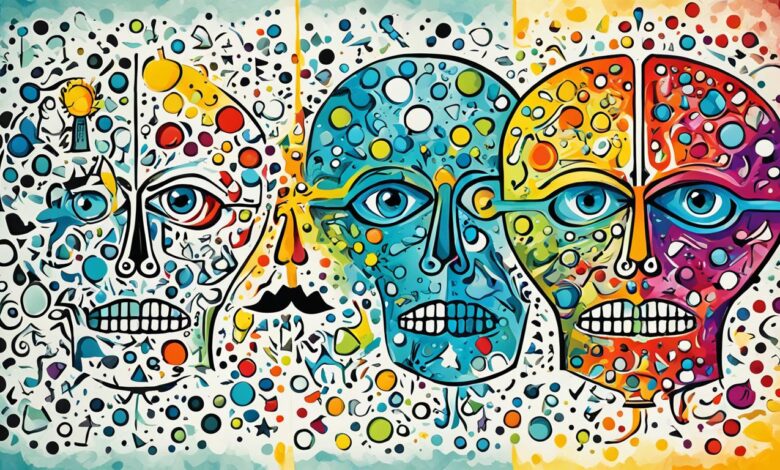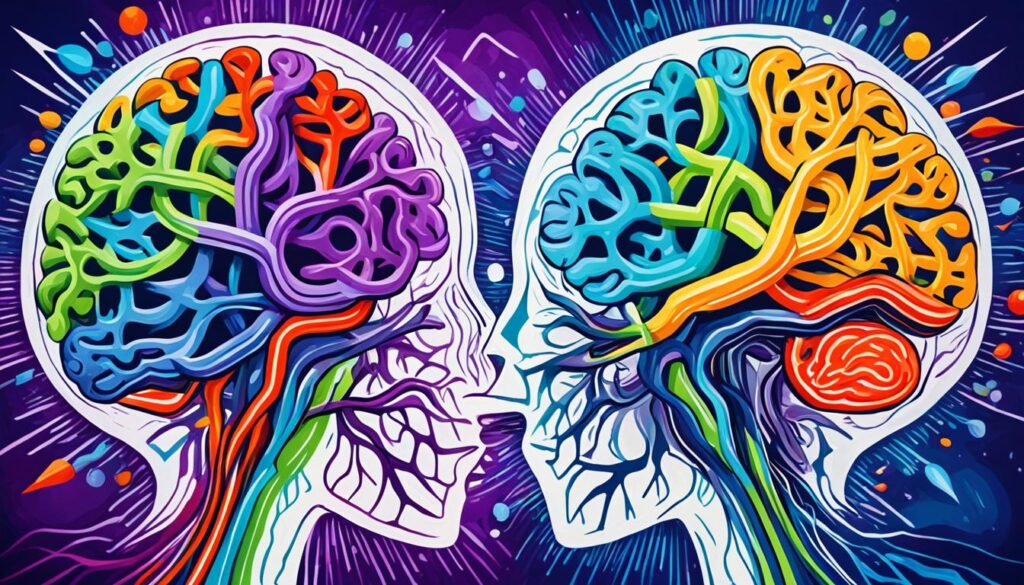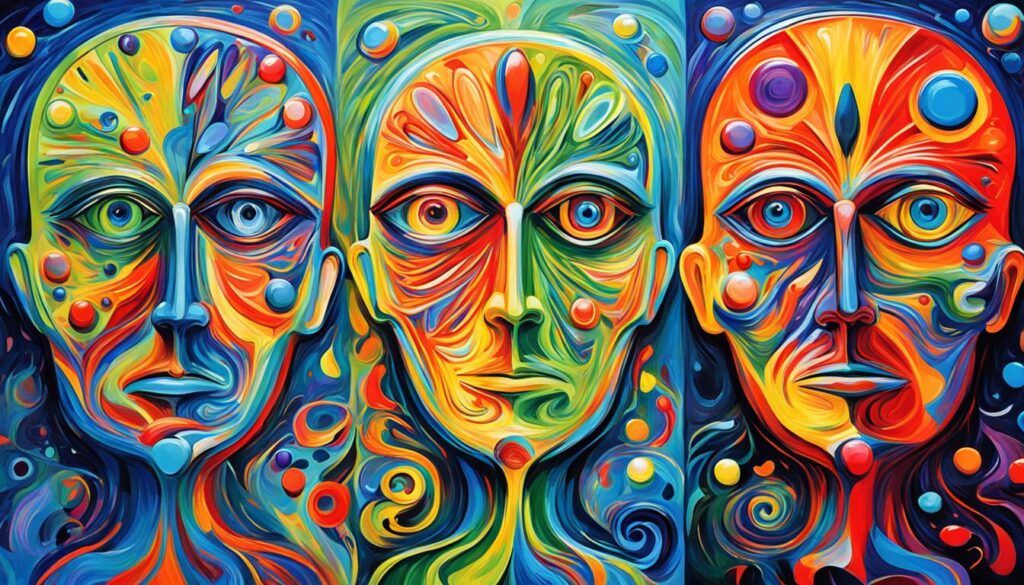ADHD and Bipolar Disorder: Unveiling Links

Imagine a world where your focus jumps and mood swings sharply. This is what many face with ADHD and Bipolar Disorder together. Looking into ADHD and Bipolar Disorder reveals more than just clinical facts. It shows the personal struggles of those living with both conditions. These individuals balance the rush of impulsiveness and deep mood swings.
This balance is their daily reality. It helps us see the link between ADHD and Bipolar Disorder. Their experiences shine a light on both shared challenges and strength.
Exploring ADHD and Bipolar Disorder symptoms brings us closer to understanding. We learn about their struggles and victories. This knowledge prompts us to seek better care for them. It helps us see the need to know the differences and similarities of these conditions.
We aim to make research more personal in this discussion. We want to show it’s not just about facts. It’s about helping those who find their stories in science. Join us in seeing beyond the clinical aspects. Let’s explore the human side that highlights why this topic matters so much.
Exploring the Relationship Between ADHD and Bipolar Disorder
The world of mental health is complex, with conditions that often mix in challenging ways. ADHD and Bipolar Disorder are two such conditions that are distinct yet often overlap. By exploring the relationship between ADHD and Bipolar Disorder, we gain insights. These insights help us manage and improve the lives of those affected.

Understanding Comorbidity in Mental Health
Having more than one disorder at a time is common in mental health. This is true for ADHD and Bipolar Disorder. Their comorbidity reflects overlapping symptoms and possibly shared causes. A deep understanding of these conditions helps in managing ADHD and Bipolar Disorder co-occurrence effectively.
Genetic Overlap and Shared Symptoms
Recent studies have shown a genetic connection between ADHD and Bipolar Disorder. This connection helps explain why both conditions share some brain function issues. Knowing about these shared genes helps doctors treat patients better by focusing on specific needs.
Diagnostic Challenges and Clinical Implications
Telling ADHD and Bipolar Disorder apart can be hard due to similar symptoms. Getting the diagnosis right is crucial for effective treatment. Doctors need a lot of skill to treat each condition correctly. This is how we make real progress in treating mental health.
| Overlap in ADHD and Bipolar Disorder | ADHD Symptoms | Bipolar Disorder Symptoms |
|---|---|---|
| Impulsivity | Frequent interruptions | Risk-taking behaviors during manic episodes |
| Attention Difficulties | Struggle to sustain focus | Distractibility during manic or hypomanic episodes |
| Mood Instability | Mood fluctuations depending on the situation | Pronounced mood episodes lasting days or weeks |
Understanding the deep link between ADHD and Bipolar Disorder improves care. We learn more about these conditions to help those affected live better lives.
Common Symptoms of ADHD and Bipolar Disorder

Knowing the symptoms of ADHD and Bipolar Disorder is key to understanding their overlap. ADHD involves ongoing inattention and hyperactivity. Bipolar disorder swings from manic highs to depressive lows. The similar symptoms, like impulsivity, make it hard to tell ADHD vs Bipolar Disorder apart.
For treatment options for ADHD and Bipolar Disorder, knowing the symptoms helps. Treatment may involve stimulants, mood stabilizers, or both, depending on the diagnosis. The comorbidity of ADHD and Bipolar Disorder makes treating them more complex.
| Symptom | ADHD Manifestation | Bipolar Disorder Manifestation |
|---|---|---|
| Impulsivity | Difficulty with self-control, rash decision-making | Risk-taking behaviors during manic episodes |
| Restlessness | Physical hyperactivity, inability to sit still | Psychomotor agitation during manic or hypomanic episodes |
| Attention Deficits | Struggle with focus across various settings | May manifest during depressive or manic episodes |
| Mood Swings | Less commonly associated with mood swings | Defining feature of disorder, rapid and severe mood changes |
| Emotional Dysregulation | Difficulty managing emotions, frustration | Extreme variances in mood and emotional states |
This table shows the difference between each condition. However, symptoms can vary from person to person. Recognizing these symptoms is the first step towards effective treatment. Treating the comorbidity of ADHD and Bipolar Disorder is crucial for patient care.
Diagnosis Criteria of ADHD vs Bipolar Disorder
Understanding the difference between ADHD and bipolar disorder is crucial for doctors. Making the right diagnosis of ADHD and Bipolar Disorder is key to treating patients well. Although the two conditions seem similar, they have different signs. This means doctors need to be careful to identify each condition correctly for treatment.
Structured Clinical Interviews and Rating Scales
Doctors use special tools like SCID-I/P for DSM-IV-TR interviews. These tools help doctors see how ADHD and bipolar disorder differ. For example, bipolar disorder has manic episodes, unlike ADHD’s constant inattention. Also, rating scales give clear data. This helps in managing ADHD and Bipolar Disorder co-occurrence.
Importance of Accurate Diagnosis for Effective Treatment
When someone has both ADHD and bipolar disorder, treating them is tricky. Right diagnosis leads to the right treatment options for ADHD and Bipolar Disorder. Wrong diagnosis might lead to using stimulants that are bad for bipolar disorder. So, getting the diagnosis right is very important for good patient care.
Clinicians must examine patients carefully. They look at all aspects of a patient’s health. This way, treatment is tailored to each person, offering care beyond basic guidelines.
Implications of ADHD and Bipolar Disorder Comorbidity
When ADHD and bipolar disorder are both present, managing them gets really tough. This is because the dual diagnosis can significantly affect a person’s cognitive functions. People facing both conditions often show more severe cognitive issues. This situation calls for unique treatment plans that cater to the complexities of both disorders.
Finding the right treatment for ADHD and Bipolar Disorder together is tricky. It requires a deep understanding and careful approach. Treatments must consider various symptoms, like focus issues, mood swings, and impulsive actions. The goal is to treat one without making the other worse, promoting a holistic treatment strategy.
The link between ADHD and Bipolar Disorder goes even deeper, touching on genetics. Studies have found shared genetic risks, adding to the challenge of treatment. This calls for a complete grasp of a patient’s condition. To manage these two disorders well, treatments should be aware of all symptoms, considering genetic and environmental factors. Personalizing the treatment can really help improve the lives of those with both ADHD and Bipolar Disorder.






